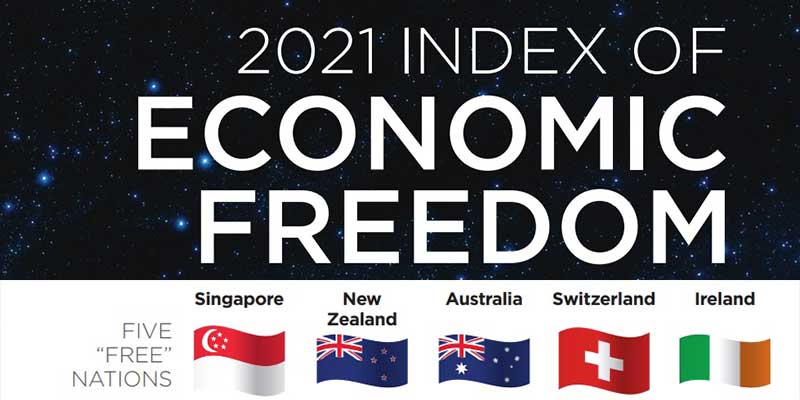- World
- Mar 10
- Mathew Gregory
Economic Freedom Index 2021
Highlights
• Singapore topped the global ranking for the second year in a row in the latest Economic Freedom Index published last week by US conservative think-tank, The Heritage Foundation.
• The 2021 Index — the 27th edition—includes:
◦ Updated economic freedom scores and macroeconomic data for 184 economies.
◦ Easy-to-read cross-country comparisons that highlight why economic freedom matters.
◦ Online tools like customized comparison charts and an interactive heat map.
• Rounding up the global top five are New Zealand in second place with 83.9 points, Australia, third (82.4 points), Switzerland in fourth with 81.9 points and Ireland (81.4 points).
• As for the major economies, the United Kingdom is 7th (78.4 points) United States is ranked 20th with a score of 74.8 points, Japan 23rd (74.1 points), Germany is 29th (72.5 points) and China is number 107 scoring 58.4 points.
• 184 countries were covered in the study this time and the period of study is July 2019 to June 2020.
• The biggest news generated from the "2021 Index of Economic Freedom" was however not the rankings or how COVID-19 impacted the scores but that The Heritage Foundation decided to exclude Hong Kong from its rankings for the first time ever.
• Hong Kong had topped the list for 25 out of the previous 26 years prior to the current year.
• The index ranks 12 indicators from property rights to financial freedom under four categories: rule of law, size of government, regulatory efficiency and open markets.
• Overall, Asia-Pacific nations generally scored lower than the world average in seven of 12 indicators: property rights, judicial effectiveness, government integrity, monetary freedom, trade freedom, investment freedom and financial freedom.
• In the 2021 Index, India came in around the middle of the pack among Asia-Pacific countries ranking 26th out of 40 countries, scoring 56.5 points.
• Globally, the Foundation rates India's economy as the 121st freest.
About Index
• The Heritage Foundation's Index of Economic Freedom is an annual guide published to measure the progress made in advancing economic freedom which it claims brings greater prosperity.
• The Foundation also believes that "the ideals of economic freedom are strongly associated with healthier societies, cleaner environments, greater per capita wealth, human development, democracy, and poverty elimination.
• For twenty-seven years the Index has delivered thoughtful analysis in a clear, friendly, and straight-forward format.
• Economic freedom is the fundamental right of every human to control his or her own labor and property. In an economically free society, individuals are free to work, produce, consume, and invest in any way they please.
• The Index of Economic Freedom documents the positive relationship between economic freedom and a variety of positive social and economic goals.
• Economic freedom based on 12 quantitative and qualitative factors, grouped into four broad categories, or pillars, of economic freedom:
◦ Rule of Law (property rights, government integrity, judicial effectiveness)
◦ Government Size (government spending, tax burden, fiscal health)
◦ Regulatory Efficiency (business freedom, labor freedom, monetary freedom)
◦ Open Markets (trade freedom, investment freedom, financial freedom)
• The Index is an excellent objective tool for analyzing 184 economies throughout the world and each country page is a resource for in-depth analysis of a country’s political and economic developments.
(The author is a trainer for Civil Services aspirants. The views expressed here are personal.)

